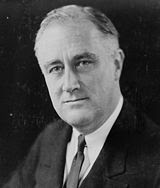|
Clearing the Decks Part 2
by Raymond Speer
 Author
says: what if FDR inherited Churchill's worst fears after the Fall of
Britain? Please note that the opinions expressed in this post do not
necessarily reflect the views of the author(s). Author
says: what if FDR inherited Churchill's worst fears after the Fall of
Britain? Please note that the opinions expressed in this post do not
necessarily reflect the views of the author(s).

In 1940, on this day what if
FDR's 1940 re-election bid was fatally undermined by defeat at Dunkirk.
a week after Hans Guderian's Panzers were ordered to advance across the Aa
Canal,
Winston Churchill had resigned, and Franklin D. Roosevelt's bid for
re-election was destroyed; in short, the outcome of the Siege of Calais
meant that the defeat of those men became final. With the Allied Forces
slipping into captivity, reconsideration of continued defiance was
assured.
Bitter recriminations had followed with Viscount Halifax, the head of the
new Peace Government. In retrospect, the Halifax-Roosevelt gambit was the
end of the American president's attempt for a third term. Roosevelt's
polls crashed and his insults to Halifax after the latter's proclamation
of a peace government were an intemperate and futile exercise of anger.
Goebbels was pleased by the cinema footage of Hitler's parade down main
streets of London with Halifax and King George seated on either side of
Hitler in the limousine. Inside of a month, Winston Churchill was in exile
at the University of Missouri where he would teach history to his death in
1965.
"I've been at the top and at the bottom," said Roosevelt, "and I can tell
the difference". The president had conferences with Charles Lindbergh in
very short order and by July 17, 1940, the Democratic Convention announced
in a speech by Roosevelt, that Charles Lindbergh would be the 1940
Democratic presidential nominee.
The Democratic thesis of that year was that the USA ought to arm itself in
every category so that it would assuredly repulse any Nazi attack, anytime
and everything. Lindbergh was the loudest advocate of such a doctrine and
FDR realized that and backed Lindbergh.
Herbert Hoover, renominated for a second term as president by the
Republicans, with Arthur Vandenberg as Vice President, ably contested the
election with a platform practically identical with the Democrats.
Lindbergh and Cordell Hull, his VP candidate, defeated them 453 electorial
votes to 68 electorial votes.
 Author
says
to view guest historian's comments on this post
please visit the
Today in Alternate History web site. Author
says
to view guest historian's comments on this post
please visit the
Today in Alternate History web site.
Other Contemporary Stories
Raymond Speer
Guest Historian on
Today in Alternate History, a Daily Updating Blog of Important Events In
History That Never Occurred Today. Follow us on
Facebook, Myspace and
Twitter.
Imagine what would be, if history had occurred a bit
differently. Who says it didn't, somewhere? These fictional news items
explore that possibility. Possibilities such as America becoming a Marxist
superpower, aliens influencing human history in the 18th century and Teddy
Roosevelt winning his 3rd term as president abound in this interesting
fictional blog.

Sitemetre

 |